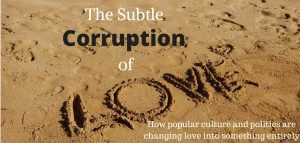 My new 20-day skill learning challenge is to listen and internalize 20 videos by Hungarian, now dead, psychologist, Peter Popper.
My new 20-day skill learning challenge is to listen and internalize 20 videos by Hungarian, now dead, psychologist, Peter Popper.Why am I doing this challenge? What will this give me?
I am self-taught... or more precisely: I have an education that is hodge podge, eclectic: I gathered knowledge from all over the place, and I have gaping holes, that until this day I had no idea where to fill or how.
The gaping holes are so big, that some of my students could slip through: Whatever I knew didn"t help them to become all they can become.
With that said, I listened to a Dr. Popper masterclass on youtube, sadly, it is in Hungarian, with subtitles that you need to set to your own language...
Dr Popper"s masterclasses, a whole lot of them, have 60% truth value, 30% of what he says fills in my gaping holes.Popper is talking about something very important. He says that we are all born totally self-centered, self-referential, and are that way through most of our childhood.
He also says that at certain point, the mother who was fully and wholly a problem solver for us, suddenly turns around and causes bad feelings to us by saying "don"t do this and don"t do that"... very unpleasant.
And then he talks about the moral rules we hear, and we think that adults, especially our parents, must be an example... and one day we discover that they say one thing and do another, lie, encourage us to lie, they steal, cheat, don"t do what they said they would do, etc.
It is very confusing. It"s incongruent with what we were taught.
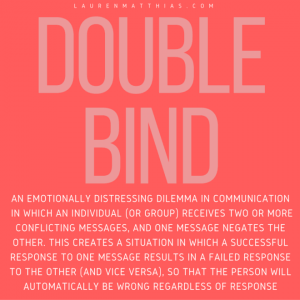 The empath curse
The empath curse
And if the child is an empath, the parent"s behavior and words are incongruent in myriads of other ways... Like the double bind...
Knowing what is good and what is bad, knowing the rules is one thing. Internalizing them in another: in that stage, when you internalize the rules, make them your own, you become a moral being. They are no longer imposed on you.
But for empaths, this is harder than for non-empaths: I think this is why I was called "amoral" as a child: I did not internalize the moral code, because of all the incongruence between people"s behavior and their words.
I had to create my own moral code, and internalize that.
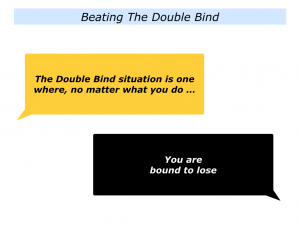 I have empath students as amoral, as bumbling, as confused as I was, looking for rules to live by, but finding that it"s not that simple... Their "matzpun", their compass, their conscience isn"t working. ((The compass, the conscience, when the moral laws have been internalized, expresses itself in feelings, a pressure here, a push there... kinesthetically. The empath child wants to avoid the world of feelings where they have been hurt and confused, and move towards brainy stuff... So an empath child has only brainy guidance, mind stuff, that doesn"t care that everything and the opposite is called right... Ugh. difficult.))
I have empath students as amoral, as bumbling, as confused as I was, looking for rules to live by, but finding that it"s not that simple... Their "matzpun", their compass, their conscience isn"t working. ((The compass, the conscience, when the moral laws have been internalized, expresses itself in feelings, a pressure here, a push there... kinesthetically. The empath child wants to avoid the world of feelings where they have been hurt and confused, and move towards brainy stuff... So an empath child has only brainy guidance, mind stuff, that doesn"t care that everything and the opposite is called right... Ugh. difficult.)) They don"t know how to meet their own expectations of themselves, because they don"t have a coherent congruent self-image. They don"t have their mental representation for how to be an honorable, lovable, productive human being.
They don"t know how to meet their own expectations of themselves, because they don"t have a coherent congruent self-image. They don"t have their mental representation for how to be an honorable, lovable, productive human being.And, of course I wasn"t quite aware of what I did, or what process I had gone through, so until today I could not see what I didn"t see.
I knew, deep inside, that there was some reason I kept these "unteachable" students around, in spite of all the frustration I experienced. I was, in fact, fueled by their stuckedness, nudged on and on, to learn more, think more, so I can move them.
Here is a little 3-minute segment of a Popper talk, with English subtitles, to give you a flavor of how 60% truth value sounds.
https://www.youtube.com/watch?v=FTkIfFMvdjk
Obviously, Popper is a trained and practicing psychologist, and I am... eh, an architect? So he has been reading, seeing, understanding, and experiencing stuff that is very useful for my purposes.
And yet, but yet? we seem to look in the same place to evaluate if the "stuff" is useful or not. Where the stuff comes from, and where it takes you.
It is the most exciting thing to learn from someone whose roots, whose world view, whose moral convictions are similar to yours. Because you are validated while you are learning new things: no arguments, no resistance, no fear... I experience being OK.
Priceless. Even though he is twice, three times bigger than me, I don"t experience being small. Or big. I experience gratitude. I cry tears of joy. Love, whatever that is...
Most of my students are non-readers
How do I know? From the language they use. Impoverished. Reading articles make you a non-reader. Writing articles maybe doubly so. ((I measure your vocabulary, accurate vocabulary, distinguishing words, in my Starting Point Measurements.))
 It is as if they thought that they can be artists and use five colors only to paint the Mona Lisa.
It is as if they thought that they can be artists and use five colors only to paint the Mona Lisa.The only place to learn words, expression, is by reading. Reading in a particular way.
What is that particular way? you ask. By allowing the words modify you, influence you, move you, and observe it. From the inside, from the outside.
When your language is impoverished, your world is impoverished, because your experience is impoverished.
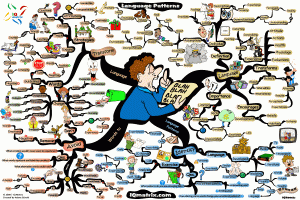 Most of my health consultation clients eat fast and without any distinctions. They shovel the food in, without giving themselves any time to experience. Of course, you can only experience what has been distinguished, which is largely what experience has been named. By you.
Most of my health consultation clients eat fast and without any distinctions. They shovel the food in, without giving themselves any time to experience. Of course, you can only experience what has been distinguished, which is largely what experience has been named. By you.That means words. If you don"t have words for something, language for something, you cannot experience it.
Reading to get through the book, reading for understanding, reading to check it off your list leaves you impoverished both in experience and in language.
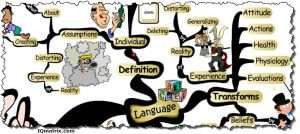 In the Playground program one of the tasks, the backbone of the program, is to look at a story, a happening, in the present, or in the past... and glean out of the story what is real. Reality.
In the Playground program one of the tasks, the backbone of the program, is to look at a story, a happening, in the present, or in the past... and glean out of the story what is real. Reality.But if what you glean, the reality, can be expressed in a few basic words, then the program won"t do its job on you, and your stories, because the contrast between your strong emotions and the reality will be too big.
 One of the techniques a practitioner used on me is to take me back to a defining experience in my life, and made me expand my cone of visions to include all the colors, sounds, smells, tactile sensation, so the reality could stand there and hold its own, in the face of the traumatic emotions.
One of the techniques a practitioner used on me is to take me back to a defining experience in my life, and made me expand my cone of visions to include all the colors, sounds, smells, tactile sensation, so the reality could stand there and hold its own, in the face of the traumatic emotions.Also Dianetics has a method, called Analysis, and a book called Self-Analysis, that is designed to expand the reality inside which you had a trauma, a disappointment, a hurt.
I have bought a few copies of the book that is sold for a few dollars, including shipping.
I was planning to use it in the series: Feel your Feelings that lead to the course From Upset to Communication.
As I am listening to the partner calls, I am saddened by the reality that your life experience cannot be bigger than your feelings/perception vocabulary.
Imagine living in a country where you only know 200-300 words, and can"t even follow most conversations, because even the simplest conversations use more the 200-300 words.
Understanding, approximately, is not the same as experiencing it... and that "it" can stand for anything.
To experience something you need to be able to actively name the experience, the words.
When you read with an agenda, even if the agenda is to learn something from the book, you end up not enjoying the book, hoping to get to the end of it, as if you were hoping to get to the end of life, this two-bit existence you are living.
Your life is as rich as the things you can say. Not understand, but say. What you can"t say, you can"t even really notice, unless someone points it out to you.
You don"t want to spend time alone, having nothing to do, because your life is empty when there is nothing to do. Why empty? Because you are empty. Your fullness comes from the distinctions, the experiences, the perceptions, the richness of life.
You are terrified from the empty silence when you don"t have to do anything. You run from it... to anything.
Start to expand your vocabulary, words and sensations, and you will love to be with yourself. You will be good company.
Until then? You are, forgive me for saying this, you are boring.
Savor, chew on, ponder, contemplate. Learn the vocabulary. Let me say it again: anything you cannot express is invisible to you...
PS: I just noticed that I let that title just hang there... like a bait... and never elaborated on it.
I have been wondering why it was that in the early days of my teaching, the early days of this site, my students loved me, and today they don"t... or not really.
Yesterday, listening to Dr. Popper, I heard that when you give a child the experience that your love is unconditional, and there are no conditions that prompt you to take away that love, they will not develop properly, and more importantly, they won"t fear losing that love.
In the early days I let people go. I ejected them from a webinar, I threw them out of a course. In effect I set boundaries, and made clear that the love is not automatic.
So they clung, clawed, tried real hard. While today there is no threat of loss, so there is no value to that love.
Live and learn. Hard learning.
This is true for everything, not just love.
When in 1987, volunteering in Landmark Education, my manager said: you are fired, I suddenly, on the spot, fell in love with the job. I answered, in my head, "You can"t fire me from MY job. you can fire me from YOUR job... but not from mine..." so I continued doing the job. She fired me again and again, and every time I put more love into the job, and in the end I accomplished the impossible. In the job. A heroic result.
Without her firing me, I would have fizzled out.
One of my students, a university student, had an essay to write. He missed the deadline... and asked for an extension, and then another and another. He handed in his essay later than late.
No consequences. He was "educated", trained to do little to no work, and still pass, still stay in the course.
My guess is that this has been his life: he never got the stick end of the "carrot and stick" and he is now confused, and lost... No boundaries make for an unhappy person. Guaranteed.
No comments:
Post a Comment